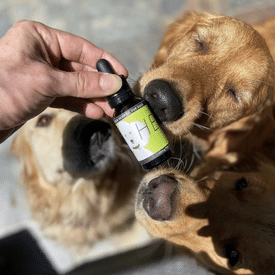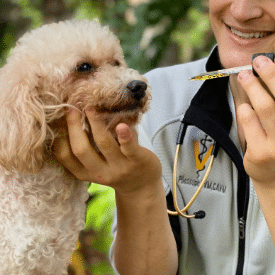CBD for Diabetes in Dogs & Pets

Dealing with pet diabetes, such as diabetes in dogs and cat diabetes, can be a challenging journey for any pet owner. As pet owners, we understand the gravity of managing health issues in our beloved dogs and cats, especially when it comes to conditions like diabetes in dogs and pet diabetes in general. The quest for natural, effective solutions is paramount, raising a vital question: Can CBD help diabetes in dogs and cats? This natural remedy for pet diabetes management has been garnering attention for its potential to provide relief and support in diabetes management.
Table of Contents
What is Diabetes?
Diabetes in dogs and pets, as a general diagnosis, is a type of disease primarily affecting the function of the pancreas and the proper metabolism of food for energy. The pancreas secretes one of two chemicals, insulin or glucagon, to properly regulate blood sugar. Glucagon keeps blood sugar from getting too low (hypoglycemia) by breaking down glycogen to glucose in the liver. Insulin helps keep blood sugar from getting too high (hyperglycemia) by enabling blood glucose to enter cells, which they use to produce energy.
When your dog eats, they produce insulin. Insulin will help your cells absorb glucose; think of it as the key to the door of the cells. When your dog consumes carbohydrates, they break those carbs down into glucose. With the help of insulin (the “key”), glucose gets absorbed into cells and used for energy. However, not all the glucose gets broken down, and much is stored in the body’s tissues.
When dogs repeatedly consume too much carbs/sugar in their diet, their pancreas stops responding appropriately to the sugars, and blood glucose (the amount of sugars in the bloodstream) becomes too high and can damage the body. When this happens, owners start to notice the telltale signs of diabetes in dogs or cat diabetes. Excessive thirst, weight loss, and excessive urination are the first signs of pet diabetes an owner will see. With these symptoms present, your vet will do bloodwork and an exam to determine what’s happening and make a definitive diagnosis. Proper diagnosis is essential since other diseases like Cushing’s can have the same symptoms as diabetes in dogs and pets.
Causes of Diabetes in Dogs & Pets
Pets that consume too much processed, high-carbohydrate food are those with the highest likelihood of developing pet diabetes. Since diabetes is inflammatory in nature, any dog with concurrent inflammatory concerns while eating kibble has compounded their risk of dog diabetes. Kibble in and of itself is pro-inflammatory, so it will always heighten the disease risk. In addition, since obesity is not only the most prominent health problem affecting dogs, it is also widespread in kibble-fed dogs, this only further compounds their risk of diabetes.
Some breeds seem to be more predisposed to dog diabetes, such as beagles, golden retrievers, pomeranians, and miniature schnauzers, among several others. Dogs with chronic pancreatitis are also at a higher risk of developing dog diabetes due to the chronic stress and damage done to their pancreas over time.
Another risk factor for diabetes in dogs and pets is chronic use of drugs and/or antibiotics, leading to a leaky gut. A leaky gut can often cause autoimmune disease, a concurrent risk factor for diabetes. On this same note, vaccines and toxins like pesticides and heavy metals will also damage tissues, especially in the gut, increasing the likelihood of inflammation, autoimmune issues, and pet diabetes.
Types of Diabetes in Dogs & Pets
There are three types of diabetes in dogs and cats: diabetes mellitus, diabetes insipidus, and gestational diabetes.
Diabetes mellitus is the most common type of diabetes in dogs, caused by a lack of insulin. This type of diabetes has two sub-types: Type 1 and Type 2. Type 1 is the kind that most dogs with diabetes get. Type 2 is much more rare in pets. Diabetes mellitus can be caused by Cushing’s Disease, pancreatitis, and overuse of steroids. Dogs with this type of diabetes may be at higher risk of UTIs and cataracts.
Diabetes insipidus is caused by reduced antidiuretic hormone (ADH). ADH regulates water metabolism and helps keep water in the body. Too little ADH, and your body will dehydrate. Gestational diabetes is a less common form of DI and is only present in a pregnant dog. This type of dog diabetes can often go undiagnosed and usually resolves after birth.
Typically, veterinarians recommend that a dog with diabetes of any type receive insulin and unrestricted access to water since diabetic dogs need additional hydration.
Symptoms of Diabetes in Dogs & Pets
If you are concerned that your pet is suffering from diabetes, there are a few telltale signs of diabetes in dogs or cat diabetes to watch for:
- Excessive drinking & urination (PU/PD)
- Loss of appetite
- Vomiting
- Dehydration
- Depression & lethargy
- Unkempt haircoat & dandruff
- Muscle loss & weakness
- Weight loss
Managing Pet Diabetes
If you have a diabetic cat or diabetic dog, managing the disease is vital to maintaining quality of life. There are many options for managing diabetes in dogs and pets, but the most common is using insulin shots to maintain blood sugar. Although common, this option requires a strict dosage schedule, and you will unfortunately have to inject the insulin, which is slightly painful for your pet with diabetes.
With the help of your holistic veterinarian, it may be possible to eliminate the need for insulin for your diabetic dog by using specific herbs and supplements and altering the diet to stabilize blood sugar. Many people choose a keto-style diet for their dog with diabetes, meaning fresh food with higher fat and protein and very few starchy carbs. This diet for diabetes in dogs will maintain a more stable and balanced blood sugar level throughout the day, as opposed to more carb-rich foods like kibble that spike the blood sugar, increase inflammation, and increase the need for insulin over time.
In addition to diet and supplementation, exercise is crucial for keeping diabetic dogs and pets at their best. A lack of exercise will only further inflammatory issues, create instability in the joints and spine, and lead to excess weight.
Keeping your environment non-toxic and clean is also essential for dogs with diabetes. Lessening the stressors to the body, especially endocrine-disrupting chemicals found in most scented cleaners, candles, and air fresheners, is critical to maintaining wellness of your diabetic cat or dog.
CBD for Diabetes in Dogs

So how can CBD for diabetes in dogs and pets help? Diabetes in dogs and pets, at its foundation, is an inflammatory disease. We already know that CBD is one of the best anti-inflammatories there is.
A recent study states:
“Oxidative stress and inflammation play critical roles in the development of diabetes and its complications… Studies provided compelling evidence that the newly discovered lipid signaling system (i.e., the endocannabinoid system) may significantly influence reactive oxygen species production, inflammation, and subsequent tissue injury, in addition to its well-known metabolic effects and functions.”
Another recent study found that full-spectrum hemp extract CBD lowered the instance of diabetes in non-obese diabetic mice. Yet another study found that full-spectrum hemp extract CBD may also improve circulation and improve overall health in diabetic rats. These studies are promising that full-spectrum hemp CBD can help with diabetes in dogs, pets (and humans).
It is important to note that before you change a diabetic dog’s diet or attempt to wean off insulin, you should speak to your holistic veterinarian to prevent a sudden drop in blood sugar. You can safely use CBD for diabetes in dogs and pets in conjunction with insulin, but should ensure that the full-spectrum hemp CBD you use does not have added sugars.
Dosing CBD for Diabetes in Dogs & Pets
Despite common misconceptions, dosing full spectrum hemp CBD has little to do with your dog’s size or weight. Finding the proper dosage depends on your specific dog, their specific ailment, such as pet diabetes in this case, and how sensitive their endocannabinoid system is.

We recommend starting with 9-12 mg daily while monitoring your pet’s blood sugar levels. One full dropper of EASE is approximately 9mg of CBD. Remember: diet is essential in diabetic dogs and pets, and a raw or freeze-dried diet may be a safer option for your pet. Discuss diet changes for your dog with diabetes with your holistic veterinarian.
For the fastest and most thorough absorption of CBD oil for diabetes in dogs, lift the lip and apply the dose directly onto the gums, as the most direct way into the bloodstream. If added to food, the CBD oil may not be as effective and can take significantly longer (30-45 min) to reach the bloodstream as it works through the gastrointestinal system.
Medicinal Mushrooms for Diabetes in Dogs & Pets
Medicinal mushrooms for diabetes in dogs and pets are an excellent way to help holistically manage your pet’s diabetes by regulating blood sugar. Several mushrooms have been studied and shown to manage blood sugar effectively; these include Reishi, Maitake, Shitake, Cordyceps, and Chaga.
Almost all medicinal mushrooms can lower or help stabilize blood sugar due to their polysaccharide content. Polysaccharides are found in the soluble fiber beta-glucan, a key component of mushrooms. These fiber compounds help slow digestion and the rate at which the body absorbs sugars, great for dogs with diabetes. They effectively help slow blood sugar spikes after meals, making insulin less needed.

All three MycoDog mushroom tinctures offer benefits for dogs with diabetes, with a blend of medicinal mushrooms and adaptogens for your pet’s best health. MycoDog’s Vitality mushroom extract & adaptogen tincture is a proprietary water extract of Turkey Tail, Reishi, Shiitake, Maitake, Chaga, Artist Conk and Red Belted Conk, with Astragalus Root and Ashwagandha preserved in organic, vegetable glycerin. MycoDog’s Breathe mushroom extract & adaptogen tincture is a proprietary water extract of Cordyceps, Reishi, Artist Conk and Chaga, and Ashwagandha. MycoDog’s Clarity mushroom extract & adaptogen tincture is a proprietary water extract of Lion’s Mane, Reishi and Cordyceps, with Bacopa Monnieri and Ashwagandha preserved in organic, vegetable glycerin.
Natural Managing Pet Diabetes
A diabetes diagnosis for your pet can be a difficult one to hear from your vet. Thankfully, if you act quickly and look at the condition from a more holistic perspective, you will see there are quite a few very effective tools to help keep your diabetic dog or cat happy and healthy while managing this disease. Full-spectrum hemp extract, medicinal mushrooms, fresh whole foods, and other natural tools for managing dog diabetes or cat diabetes are all out there to naturally help your pet have more balanced blood sugar levels, which will stave off further inflammation and the need for higher amounts of insulin to be given.















